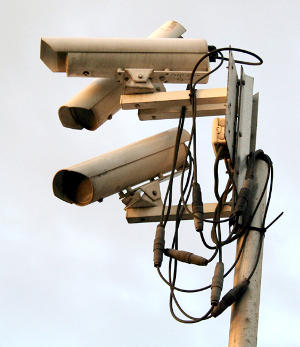Do you have any traffic tickets you neglected to pay? You know, the kind that eventually turn into bench warrants and cause you to be super careful when you drive, lest you get pulled over for yet another minor infraction and end up handcuffed in the back of a squad car, on your way to spend a few hours in the local hoosegow until your significant other shows up with bail? If so, don’t worry. As long as you manage to not get pulled over, you’re still reasonably safe. But the time is rapidly coming when just walking down the street minding your own business might cause a squad car to be dispatched to pick you up to make sure you pay your fine, thanks to our old buddy, facial recognition.
 I know this is old news and it seems like implementation of the technology in such manner is years away — but I think it’s coming quicker than we think. Some may even think this to be no big deal. After all, what’s wrong with the fuzz having the ability to pick lawbreakers out of downtown pedestrian traffic or while on a jaunt across the parking lot to Office Depot at a local strip mall? Wouldn’t that include the ability to get dangerous violent criminals off the street?
I know this is old news and it seems like implementation of the technology in such manner is years away — but I think it’s coming quicker than we think. Some may even think this to be no big deal. After all, what’s wrong with the fuzz having the ability to pick lawbreakers out of downtown pedestrian traffic or while on a jaunt across the parking lot to Office Depot at a local strip mall? Wouldn’t that include the ability to get dangerous violent criminals off the street?
Well, yes. But this old hippie still doesn’t like it. During my life I’ve seen too many instances where the police overzealously abuse a new technology they’ve embraced. Think tasers or pepper spray — or swat teams for that matter. Do a Google to get an idea of how many unarmed citizens have been dispatched to their graves through the wrongful use of tasers or pepper spray — although the investigation of these incidents rarely find fault with the officer who did the dispatching.
Already many police departments have cameras on their cars which scan license tags, both of parked cars and vehicles in traffic, in the hope of accidentally finding a car owned by someone who’s on the lam. In the few short years that these readers have been in use, they’ve already bein misused. For example, in some jurisdictions cops have been known to scan tags outside of bars, then later look for these autos on the road for potential DUIs. This may sound good, until you consider the fact that having been parked in the vicinity of a bar doesn’t give probable cause to pull a driver over for being intoxicated. I park near bars all the time, and I haven’t touched alcohol since 1997.
Similar misuse is a certainty with facial recognition.
The day is rapidly approaching when every city in the U.S. will be like London is now, with surveillance cameras connected to a grid covering every cubic inch of the city, not dissimilar to what we see weekly on “Person of Interest”. Already, in London, computers connected to these cameras can detect “suspicious behavior”. Add facial recognition technology to that and it really will be like “Person of Interest”, especially in a nation that’s convinced that terrorists are hiding around every corner. The technology is sure to be abused, as law enforcement has never found a technology they didn’t overuse.
As an old hippie, I have a strong aversion to Big Brother, even though my lifestyle (alas) is about as squeaky clean as the Pope’s. Thankfully, I’m not alone in seeing danger lurking in the use of this tech. In an article published today on Ars Technica, attorney Jennifer Lynch at the Electronic Frontier Foundation (EFF) says, “Facial recognition performs poorly under many of the conditions where law enforcement wants to use it—for example, trying to identify people on the street or captured on surveillance cameras. Even the FBI’s new facial recognition system, NGI, only guarantees accuracy 85 percent of the time. It is also unnecessary when compared to fingerprints, which have proved to be a highly effective form of identification.”
Dollars to doughnuts, that 85 percent figure will be up to well over 90 percent within a year or two. And the potential for abuse is clearly present. “From the perspective of a civil liberties advocate, the wide deployments that can identify individuals at a distance, is that this changes completely the dynamic of privacy in public,” the Ars article quotes Harley Geiger with the Center for Democracy and Technology as saying. “In the US we have this idea of reasonable expectation of privacy which allows for some unreasonable searches. It allows for tracking at a broad scale. It’s not just something that will identify criminals or suspects, it will be used to identify people with no relation to crime or wrongdoing.”
I have no doubt that’s true.
These are scary times in which we live. Not only do we have to worry about attacks by muggers and thieves, we also have to worry, perhaps moreso, about our much better equipted police.
Christine Hall has been a journalist since 1971. In 2001, she began writing a weekly consumer computer column and started covering Linux and FOSS in 2002 after making the switch to GNU/Linux. Follow her on Twitter: @BrideOfLinux







Unfortunately, I don’t think there’s any way to stop this. Even if you changed things up by wearing glasses or a false nose or whatever, technology is just going to add more vectors for more accuracy, like how you walk. Sure, if you were aware you were being watched that moment, you could vary your rhythm, length of stride, and how you point your feet, how you swing your arms. But it will become as difficult (impossible) to change your appearance as it currently is to change your voice.
Work for and trust the powerful few. What’s best for them is best for you.
I’m afraid you’re wrong what best for them is best for them. That’s especially the case in the US
@hello Winston Smith is, of course, the protagonist in 1984.
Is it just me or does anyone else see the irony between the article and the requirement to provide name and email address to comment on the article?
Well, you don’t have to provide your real name. And it’s easy to pick up an email address. So not a huge irony there.
I’d just like to make a quick note on technological inevitability, or the lack thereof. There’s a fatalistic tendency for people to throw up their hands and conclude that if it can be done, it will be. But there are lots and lots of things that technologically can be done, but aren’t. Technologically, we could have the government put banana-dispensing machines in every home which would hand you a banana when you pressed a button, as long as you periodically put a bunch in the hopper. But there’s no funding for it; people don’t particularly want this to happen, the government doesn’t find it politically desirable and so on.
Bottom line, if we made it politically untenable to do this kind of thing or be seen associating with funding for this kind of thing, if we eliminated the NSA et al’s budget and laid off the staff, a whole lot of things that were thought to be inevitable suddenly wouldn’t be happening. Ultimately the technology doesn’t make things inevitable, the money does. Take it away and they’re not inevitable any more.
I agree the police state will expand to fill all available money. And it will be abused, I remember a case of a cop pulling records for his girlfriends car to see where she had been…
I am somewhat disagreeing with this statement.
<>
should possibly be
<>
http://en.wikipedia.org/wiki/List_of_terrorist_incidents_in_Great_Britain#2000s
My favorite ones on this list are the ones where the only person injured was the terrorist.
Dan
especially in a nation that’s convinced that terrorists are hiding around every corner.
should be
especially in a nation that’s had multiple terrorist attacks.
sorry, special characters…